Pride and Prejudice and Zombies: Is Jane Austen Rolling in Her Grave?
Jane Austen’s Pride and Prejudice is an immortal text that has lived to see at least twenty-five adaptations and references within popular culture since its publication in 1813. Of all these films, novels, and other forms of media, one of the most divergent works is director Burr Steers’ 2016 film Pride and Prejudice and Zombies.
Based off a novel of the same name by Seth Grahame-Smith, the film closely follows the basic plotline of Pride and Prejudice, apart from the obvious addition of a zombie infestation. At first glance, such an addition likely appears absurd, especially to purist readers of Austen’s texts. But this adaptation arguably provides a new, valuable view of the themes in Austen’s original novel, proving it to be more than just another ridiculous zombie film. In fact, Pride and Prejudice and Zombies is a good starting point for discussing what is means to preserve the integrity of a text, especially when comparing a contemporary piece of popular culture to a work that has long been considered a part of the English canon. While the film includes some contemporary additions to Austen’s original Pride and Prejudice—including the flesh-eating undead—Pride and Prejudice and Zombies tackles the themes of feminism, the warzone of love and money, and the anxiety surrounding economics to a similar effect that Austen introduced to her audience in the beginning of the nineteenth century. By exploring how these themes interact, audiences may develop a better understanding of both the original text, and how it applies to the contemporary world.
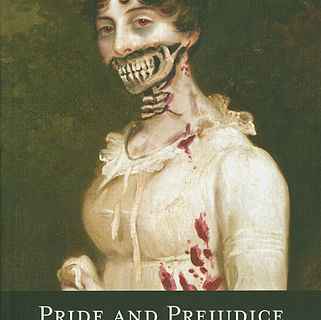
Grahame-Smith’s 2009 novel Pride and Prejudice and Zombies was originally promoted as the work of an “anti-fan,” 1 meaning Grahame-Smith did not have any interest in promoting or supporting Austen’s novel. In fact, the text was meant to act as a rebellion against Austen’s dominant cultural authority in the realm of literature, especially within the classroom. 2 This notion elicited an angry response from Austen apologists and purists, and Grahame-Smith notes that he “faced the wrath of Austen fans on blogs.” 3 That being said, the Sunday Times at the same time recognized the rise in Austen fans expressing their love for the new rendition, evidently finding merit in its new presentation of the classic story. 4 This polarized response to the novel alone reveals that Grahame-Smith’s text—along with the film that followed—is more than a piece of arbitrary fan (or “anti-fan”) fiction.
Despite Grahame-Smith’s initial intentions with his novel, his stance on Austen was clearly changing when he was found “telling audiences at bookshop signings that they ought to be reading the original Austen.” 5 This change came to fruition with the release of the interactive version of the novel made for tablets, which places Grahame-Smith’s rendition directly beside Austen’s original Pride and Prejudice. 6 While the film is obviously not exactly the same as the novel, knowing this history of the book proves that the film cannot be entirely separated from Austen’s text—nor should it be. Instead, audiences should consider how the changes made in Pride and Prejudice and Zombies influence a contemporary reader’s interpretation of the text, and how the changes interact with the original themes Austen explored in the early nineteenth century. By doing this, readers and viewers will determine how well Pride and Prejudice and Zombies preserves the integrity of Austen’s original work. Before this can occur, one must first explore the intricacies of what it means to maintain the integrity of a novel, especially a novel that has been seriously studied for centuries.
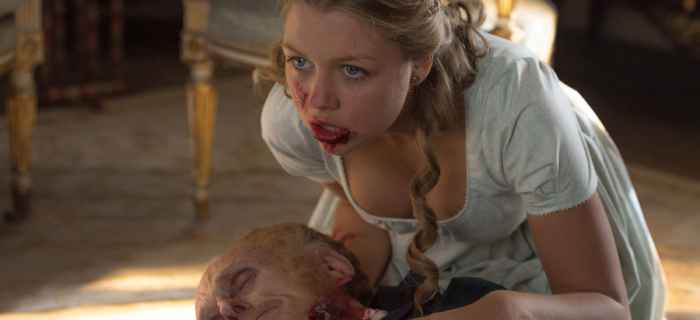
So what does it mean to preserve the integrity of a piece? As previously referenced, a purist would likely assume a new rendition of an original work to be preserving the original work’s integrity when it matches the original as closely as possible. This view is made especially evident in the present day when audiences critique a film’s adaptation of a book based on how closely it follows the plot and character descriptions, down to the specific details. Purism also implies a greater respect for “high” culture texts over “low” culture, of which Austen fits the former and Grahame-Smith and Burr Steers’ work falls into the latter. By this definition, Pride and Prejudice and Zombies surely does not preserve the integrity of Austen’s Pride and Prejudice. But, as Camilla Nelson notes, fans defending both the new novel and the film have condemned this point of view, citing the fact that “in the early nineteenth century the relationship between high and low culture was far less rigid,” 7 and in all likelihood Austen would appreciate the comedy if she were alive today.
So what other factors can be used to analyse the integrity of a work? One aspect that allows for a more general view of a piece is how closely the adaptation deals with its main themes. While the plot of a novel is undeniably important, the messages and subject matter derived from that plot is arguably even more important in the study of literature. In this case, Pride and Prejudice and Zombies can still be considered a work that preserves the integrity of Austen’s novel. As will be explored, the film has the same feminist undertones—with some added contemporary feminist ideals to appeal to a contemporary audience—deals with the same issues of love and marriage in relation to wealth, and provides a commentary on economic struggles, just as Austen was known for two hundred years ago. It is worth noting that the film does not proclaim to be presenting an exact rendition of Pride and Prejudice like other films have done, meaning it cannot be judged based on the same criteria. For the sake of this essay, in relating the film to Austen’s novel, “integrity” can be defined as the unifying elements of a text that exist outside of basic components like the plotline.
Feminism
One of these unifying elements is the connotation of feminism laced throughout both Austen’s Pride and Prejudice and Steers’ Pride and Prejudice and Zombies. Though Austen’s reputation as a feminist is up for debate, there are undeniable aspects of Pride and Prejudice that promote feminist ideals such as female independence, strength, and solidarity. For instance, Lizzie is often cited as a feminist heroine in her disinterest in marriage, along with her insistence on taking part in physical activities like walking to the Bingley’s estate—a characteristic often discouraged and deemed unladylike in Austen’s time. 8 This physical strength is amplified in Pride and Prejudice and Zombies, where women of high class are marked by both their refined femininity and their expertise as warriors against the undead. The ability to strike a balance between these seemingly opposing characteristics is an impossible standard for women to achieve, as Lizzie remarks in the film: “A woman is either highly trained or highly refined. One cannot expect both in such times.” 9 This comment directly mirrors Lizzie’s critique of Darcy’s expectations of women in Austen’s original, where she holds that she “never saw such capacity, and taste, and application, and elegance … united.” 10 The film therefore uses the zombie plotline to emphasize this critique of expectations placed upon women from Pride and Prejudice in a way that preserves Austen’s original message. The fact that Lizzie and Darcy in the film engage in combat with each other and “discover that they are equally matched” further serves as a counter to the historical patriarchal idea that women do not have the same skills as men, which is mirrored less physically in the novel when Lizzie and Darcy find themselves equally matched in terms of wit. 11

One significant and notable change that occurs between the original novel and the film is Lady Catherine’s character by the end of the story. While in Austen’s novel, Lady Catherine appears to hold anti-feminist beliefs—such as when she critiques Lizzie’s family for having all five daughters “out” at once 12—by the end of the film she and Lizzie team up to fight the ultimate enemy: the zombies. This turning point occurs in the film when Lady Catherine arrives to threaten Lizzie and they fight, resulting in the women finding themselves equally matched and Lady Catherine stating, “I don’t know which I admire more … your skill as a warrior, or your resolve as a woman.” 13 While this change is momentous in the audience’s understanding of Lady Catherine, it promotes female solidarity above all else. This concept is not unheard of in Austen’s novels; in fact, it is arguable that the most important relationship in Pride and Prejudice is not the one between Darcy and Lizzie, but rather between Lizzie and her sister Jane. The film also echoes this concept at the end, when it shows both sisters getting married on the same day, standing side by side as if they were getting married to each other. This greater emphasis on female solidarity in the film is a more contemporary feminist idea—as seen with the rise in intersectionality—and therefore is used to bring Austen’s feminist concepts to the twenty-first century for contemporary audiences to fully appreciate. Feminism is clearly a significant theme in Pride and Prejudice, and Pride and Prejudice and Zombies uses aspects of its added zombie plot to support the integrity of Austen’s original feminist concepts.
Marriage and Economics
Steers’ film also contributes constructively to the debate over marriage as a union based on love or economics that is present in almost every Austen novel, especially Pride and Prejudice. Austen is known for her concentration on wealth and status in her novels—as seen through the social divide between Darcy and Lizzie and how that affects their relationship—and Nelson argues that “the material possession of wealth and class actually assumes an increased importance” 14 in Pride and Prejudice and Zombies, as seen through the obvious divisions between characters based on who has access to dojos, who has more time to train, and where the characters received their training—that is, Japan for the wealthy, China for the less so. Cy Frost provides insight into how economics play a role in the marriage plot of Pride and Prejudice, such as how Lizzie’s refusal of Collins’ proposal and Darcy’s first proposal is incomprehensible to them because “they calculate their proposals to be economically unrefusable” 15 due to her lack of inheritance—they do not take emotional affection as largely into account as she does. That being said, Lizzie’s feelings for Darcy change when she witnesses the spectacular Pemberley estate, which “suggests Austen’s endorsement of a marriage based on both romantic and materialist foundations.” 16 This compromise is also seen in Pride and Prejudice and Zombies when Lizzie’s friend Charlotte’s choice to marry Collins for primarily financial reasons is not contested by Lizzie—instead, while she does not agree with it, she embraces quickly as another possible way to be happy in marriage. While this is a slight change from the novel, where Lizzie’s frustration with Charlotte is more evident, it more strongly supports Austen’s presentation of the compromise between love and money in marriage, as Frost suggests, thereby preserving the original novel’s integrity.
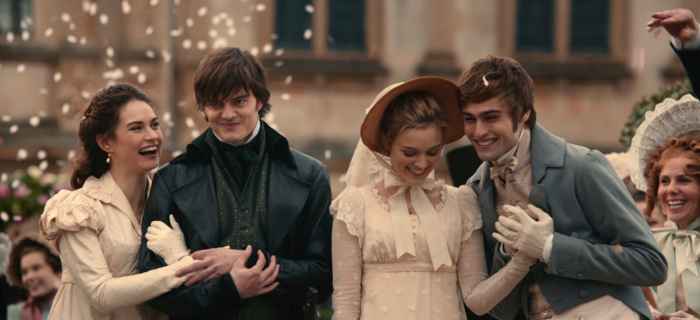
The film’s incorporation of the zombie war plot also relates to the theme of the quest for marriage as a form of war within Austen’s novel. This is especially seen in the diction surrounding marriage within Pride and Prejudice, such as when Lizzie’s father says to her, “Let me congratulate you on a very important conquest.” 17 The term “conquest” is often associated with the assumption of military control during war, making it a notable word to be used in reference to marriage. This war imagery in relation to love is emphasized in Pride and Prejudice and Zombies, such as when Lizzie says, “I’ve been training for this my whole life,” and her meaning is slightly ambiguous in how it can be interpreted to mean training to kill zombies or to land a man. In the film, Darcy culminates this combination of love and war in his admission of his love to Lizzie when he writes, “Of all weapons in the world, I now know love to be the most dangerous,” 18 mirroring the internal war Darcy experiences in Austen’s novel regarding his care for Lizzie. The zombie war plot of Pride and Prejudice and Zombies is therefore more than an absurd add-on; it is used to emphasize the emotional and financial struggle of the characters in their quest for marriage within Austen’s Pride and Prejudice.
Zombies and Economics
A closer examination of the zombies in Pride and Prejudice and Zombies reveals an even stronger correlation between the flesh-eating undead and the role economics play in Austen’s tale. Adam Cohen, in his review of the film, reflects on how “monster stories are a projection of … collective anxieties.” 19 Cohen references the recent popularity of vampire films and their relationship to the money-sucking business owners in capitalism, then notes the turn to zombies as less sleek and more “bluntly menacing,” especially in their relation to the apocalypse. 20 Zombies therefore represent a far more threatening economic pattern, often associated with the instability of war and revolution. This instability is certainly appropriate to relate to the economics and politics of Austen’s time. As Kevin O’Rourke describes, the French National Convention declared war on Great Britain in 1793, commencing a persistent warfare that did not halt until 1815. 21 This long period of unrest had a significant impact on trade worldwide, including when the Convention “prohibited the importation of large classes of British goods, and in October it banned all British manufactured goods.” 22 These wars seriously disrupted trade to Britain, causing economic instability to rise, not to mention the rise in anxiety over a potential revolution by the poor within Britain, all at the same time Austen was writing and editing Pride and Prejudice. 23
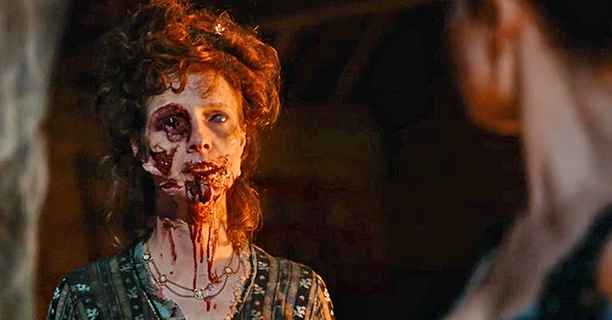
Pride and Prejudice and Zombies clearly references these occurrences within the zombie plot. For example, at the beginning of the film the audience learns that the zombie outbreak was spread due to trade, causing all trade to Britain to halt and a wall to be built around London to keep the zombies—possibly referring to the revolutionaries—out. The zombies can also be seen to symbolize another economic struggle of Austen’s time: the problems surrounding the issue of inheritance, especially for the younger sons of the family. In the film, Wickham is discovered to be a zombie, for which he blames Darcy: “If I had the living your father intended me I never would have been in the army. I never would have been infected.” 24 Wickham is therefore “infected” by having to make his own income by joining the army. Wickham’s becoming a zombie also represents the downfall of financial greed and a lack of economic responsibility, which Wickham possesses in both Austen’s novel and the film. The zombies in Pride and Prejudice and Zombies act as symbolism for the economic anxieties of Austen’s historical era, and do so in a way that contemporary audiences can enjoy in relation to other current zombie films, making them the perfect addition to connect Austen’s original novel with twenty-first century readers and viewers.
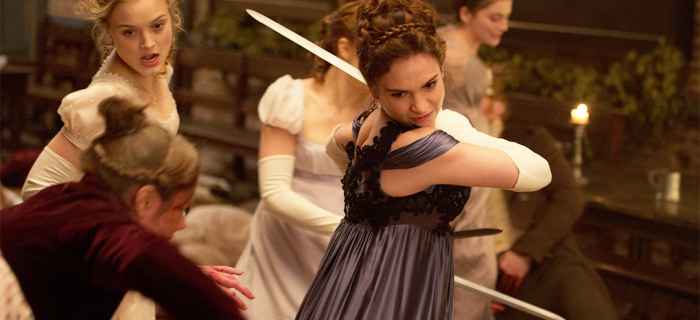
Steers’ Pride and Prejudice and Zombies, through the addition of the zombie plot, provides a new, contemporary look at Austen’s original novel, and yet still preserves the novel’s integrity by emphasizing Pride and Prejudice’s key themes. By using the zombie plot to enhance the feminist undertones, the debate over love and money in marriage, and the economic anxieties and issues within Austen’s novel, this film proves that a contemporary rendition of a classic text does not have to remain within the constraints of that text in order to do it justice. In fact, Pride and Prejudice and Zombies confirms that an adaptation can actually strengthen key aspects of the original in ways that allow contemporary audiences to identify with it and interact with it in more comprehensive and nuanced ways.
Works Cited
- Nelson, Camilla. “Jane Austen … Now With Ultraviolent Zombie Mayhem.” Adaptation 6.3 (2013): 338-354. Scholars Portal Journals, p. 339. ↩
- Nelson, Camilla. “Jane Austen … Now With Ultraviolent Zombie Mayhem.” Adaptation 6.3 (2013): 338-354. Scholars Portal Journals, p. 339. ↩
- Nelson, Camilla. “Jane Austen … Now With Ultraviolent Zombie Mayhem.” Adaptation 6.3 (2013): 338-354. Scholars Portal Journals, p. 341. ↩
- Nelson, Camilla. “Jane Austen … Now With Ultraviolent Zombie Mayhem.” Adaptation 6.3 (2013): 338-354. Scholars Portal Journals, p. 341. ↩
- Nelson, Camilla. “Jane Austen … Now With Ultraviolent Zombie Mayhem.” Adaptation 6.3 (2013): 338-354. Scholars Portal Journals, p. 341. ↩
- Nelson, Camilla. “Jane Austen … Now With Ultraviolent Zombie Mayhem.” Adaptation 6.3 (2013): 338-354. Scholars Portal Journals, p. 341. ↩
- Nelson, Camilla. “Jane Austen … Now With Ultraviolent Zombie Mayhem.” Adaptation 6.3 (2013): 338-354. Scholars Portal Journals, p. 342. ↩
- Austen, Jane. Pride and Prejudice. Ed. Robert P. Irvine. Peterborough, ON: Broadview Press, 2002, p. 60, 70. ↩
- Pride and Prejudice and Zombies. Dir. Burr Steers. Perf. Lily James, Sam Riley. 2016. Lionsgate. DVD. ↩
- Austen, Jane. Pride and Prejudice. Ed. Robert P. Irvine. Peterborough, ON: Broadview Press, 2002, p. 76. ↩
- Nelson, Camilla. “Jane Austen … Now With Ultraviolent Zombie Mayhem.” Adaptation 6.3 (2013): 338-354. Scholars Portal Journals, p. 345. ↩
- Austen, Jane. Pride and Prejudice. Ed. Robert P. Irvine. Peterborough, ON: Broadview Press, 2002, p. 191. ↩
- Pride and Prejudice and Zombies. Dir. Burr Steers. Perf. Lily James, Sam Riley. 2016. Lionsgate. DVD. ↩
- Nelson, Camilla. “Jane Austen … Now With Ultraviolent Zombie Mayhem.” Adaptation 6.3 (2013): 338-354. Scholars Portal Journals, p. 344. ↩
- Frost, Cy. “Autocracy and the Matrix of Power: Issues of Propriety and Economics in the Work of Mary Wollstonecraft, Jane Austen, and Harriet Martineau.” Tulsa Studies in Women’s Literature 10.2 (1991): 253-271. JSTOR, p. 263. ↩
- Frost, Cy. “Autocracy and the Matrix of Power: Issues of Propriety and Economics in the Work of Mary Wollstonecraft, Jane Austen, and Harriet Martineau.” Tulsa Studies in Women’s Literature 10.2 (1991): 253-271. JSTOR, p. 264. ↩
- Austen, Jane. Pride and Prejudice. Ed. Robert P. Irvine. Peterborough, ON: Broadview Press, 2002, p. 362. ↩
- Pride and Prejudice and Zombies. Dir. Burr Steers. Perf. Lily James, Sam Riley. 2016. Lionsgate. DVD. ↩
- Cohen, Adam. “Mr. Darcy Woos Elizabeth Bennet While Zombies Attack.” New York Times, 14 April 2009, A22(L), par. 11. ↩
- Cohen, Adam. “Mr. Darcy Woos Elizabeth Bennet While Zombies Attack.” New York Times, 14 April 2009, A22(L), par. 12. ↩
- O’Rourke, Kevin H. “The Worldwide Economic Impact of the French Revolutionary and Napoleonic Wars, 1793–1815.” Journal of Global History 1.1 (2006): 123-149. Scholars Portal Journals, p. 125. ↩
- O’Rourke, Kevin H. “The Worldwide Economic Impact of the French Revolutionary and Napoleonic Wars, 1793–1815.” Journal of Global History 1.1 (2006): 123-149. Scholars Portal Journals, p. 125. ↩
- O’Rourke, Kevin H. “The Worldwide Economic Impact of the French Revolutionary and Napoleonic Wars, 1793–1815.” Journal of Global History 1.1 (2006): 123-149. Scholars Portal Journals, p. 146. ↩
- Pride and Prejudice and Zombies. Dir. Burr Steers. Perf. Lily James, Sam Riley. 2016. Lionsgate. DVD. ↩
What do you think? Leave a comment.











I had very low expectations before I see this film, mainly because of the raving bad reviews. I really don’t understand where such low rating comes from. Thought it was great!
Full disclosure: I have never read Pride and Prejudice. It’s one of those novels that you’re really supposed to read, and maybe I did read it back in high school English class, but if I did, my brain has scabbed it over.
Disclosing back: I’ve read *some* of it, but mostly because I was an English major/writer, and that’s one of those books English majors are “supposed” to be familiar with. There’s a part of me that says students should still be expected to read the classics; we shouldn’t “spoil” them with modernized language and adaptations. But I’ve also seen students of all levels interact more effectively when the text is easier to understand/fit into one’s own culture. I’m not a zombie fan, so will probably never read Pride and Prejudice and Zombies, but I have very much enjoyed other modern versions.
I thought this was really well done how so much of the original story and feel was kept intact but there was so much more humor and LIFE added by the undead. Haha – yeah I laugh at my own joke. neener neener.
Yes, very much agreed! The breaking of the binary between life and death is a signature characteristic of the zombie, so your joke has critical importance, as well as being an awesome pun 🙂
I’m extremely ambivalent about this book and film. On the one hand, I think Jane is rolling in her grave. Modernized Austen I can handle, but a zombie-fied Austen crosses my personal line. Then again, classic literature is so underappreciated these days, I’m tempted to say if zombies get people interested in Jane Austen, well, bring on the brain-eaters! Really, what is so awful about placing Jane Austen in that kind of universe? We’ve already placed her work in the modern era, in the murder mystery genre, you name it. Anyway, the jury’s still out, but I’m glad to see someone writing about this.
Certainly, zombies aren’t for everybody. I’m glad you’re still open-minded to their contribution to the genre; that’s part of the reason I felt this was important to address! Who knows, maybe one day we’ll have Jane Austen in space?
Jane Austen in space…now there’s an interesting thought. Perhaps something along the lines of Regency England meets Star Trek/Star Wars? Why not? After all, we already have Amish vampires in space.
I enjoyed the dark side of this P&P retelling probably more than I should have.
Don’t get me wrong – I like classics, I like retellings, I know how to enjoy zombie stories, but this was a bad book. It was not a real retelling – it was a copy-paste story from original Pride and Prejudice with zombies added in the background to ‘spice things up’ and throw in the ridiculous idea of ninjas, eastern martial arts and other utterly rubbish concepts.
What’s better then Victorian style dressed woman killing zombies with swords.
It’s not a bad film, just not as original as it wants to be (and I wished it was!).
Having seen many of the old – and slightly tired – screen adaptations of Jane Austen’s book, I had been longing for a looser adaptation that would breathe new life into the story and would reflect a more modern representation of what counts as a strong female protagonist. Although I wasn’t expecting a zombie parody to fully satisfy this need, I watched this film expecting a nice blend of comedy-romance-female badassery.
The 21st century obsession with “zombiefying” everything does not move literacy and admiration of the written word or film adaptations toward a more profound understanding of the 18th century or even offer a reflection on our own lives–which is the goal of great literature and film.
Jane Austen must be spinning out of her grave…
Why can’t Zombies help us better understand our life and times, or the 18 Century? You haven’t really argued your case here (I am assuming that you don’t really mean that everything has literally been zombified).
I quite enjoyed the book. But I find Jane Austen generally tedious, and the kung fu brightened it considerably…especially the throwing stars
Loved it! Some really funny moments and shocks throughout. There are many many loose ends but am hoping they might be addressed in a sequel??
I hope so as well! I would love to see references to other Jane Austen novels in a sequel; I think it would be a really fun world-making/melding exercise. Fingers crossed!
Saw 2/3’s of the film before walking out, the film was all over the place I couldn’t get into it at all, I tried to see something of merit in it umm the setting looks nice costumes look authentic but I’m bored, then I start yawning and thinking this is really boring, boredom turns to frustration couldn’t give a damn about the laboured half arsed supposed witty repartee it’s dull dull dull! so off to the pub toot sweet.
In short even a zombie would turn to drink rather than brains if they had to sit though this!
Zombies creep me out, but I have got to read this. It’s just too weird to combine zombies and Jane Austen. Wonder where they shelve this book at the bookstore???
A really great question! I love how adaptations can enact a deconstruction of the sometimes strict genre categories. Would you place this in the historical fiction section, the horror section, the comedy section, or somewhere else entirely??
The first zombie interlude was funny. The second was tolerable.
After the third, I started flicking through the rest of the book to see if, at any point, they had deigned to give the book more than one joke.
They hadn’t.
I thought they pulled off the film adaptation brilliantly.
Zombies have now become the cultural chips that everyone adds when they’ve run out of ideas. In this case, it actually worked! 😀
Feminism is about reintroducing feminine values into society, not just turning women into capable male-type warriors. That is the ultimate anti-femnism, a sort of “Embrace, extend, and exterminate” strategy to elliminate feminism by rebranding it into female physical violence.
An interesting suggestion. I will challenge that there are multiple forms of feminism(s) that propose different interpretations of this theme; there is not just one true answer that can be applied to everyone. Also, the question of what exactly are “feminine values” and how are they determined is of importance in this debate. There is a gender binary at work here that I think characters like the undead zombie can help us complicate.
I forget how much I love this story. I haven’t read the original but I’ve seen all the different versions of this story. My favorite being the Bollywood version.
There’s a Bollywood version?? Oh, I have to see that.
I absolutely adore the original and other spin offs have failed to wow me. But this one is a whole lot of fun.
I had a really difficult time reading this book… I felt like the author almost copy/pasted the actual pride and prejudice and then changed a few sentences and paragraphs here and there to make it about zombies.
The love story aspect of it could have been better but the overall story was good. The zombies were well done, not cheesy at all.
I started reading this out of pure curiosity before the movie arrived. My curiosity has now been satiated and I am officially not finishing it. I am just not a fan of the classics and although the addition of zombies initially sounded appealing, this was just plain odd!
Jane Austen would of liked the book. It is pretty much the entire book with a mix of Zombies. I was laughing out loud a few times in the break room at work.
I liked it. It was much better than the book.
Having recently re-read Pride and Prejudice and followed that by reading the with-Zombies version of the story I took a different take on how the zombies changed the story. Pride and Prejudice is a socially controlled world, the lower classes with the rare exception of a servant are absent. The characters exist in this narrow social culture, contained in their own economic bandwidth that they seek to maintain or escape. In Zombies, the rest of the world invades and not only do the characters need to defend themselves from attack from outside, but there is the fear that their exclusivity can be taken from them.
I found the persistence of zombies quite admirable. It seems equivalent to the struggle for economic power by the lower classes. The fight by the Bennetts, on the other hand, is driven by the need to save their exclusive and elitist way of life and seem brutal and self-serving. It is ironic that, if a lucrative marriage had continued to elude her, fighting zombies would have given Lizzie a job opportunity.
I think this reading is really on-point! The zombies can quite easily be linked to a revolution of the lower classes and the anxiety of the upper classes to preserve the system.
Zombies and other monsters are also said to represent a form of desire. In the case of this text, it may simply be the desire for a wide-scale change and the sense of a ‘clean slate’ that can come from an apocalyptic event such as the zombie outbreak. This is another example of how zombies can link our contemporary time (with all its social and political turmoil) with Austen’s world.
Hi Heather – I am not entirely convinced that apocalyptic events result in a ‘clean slate’, but I do understand the modern day desire for widespread change. Zombies and other catastrophes are convenient methods of avoiding the need to understand social problems: problems can be buried and ignored. I think pandering to this ‘desire’ is counterproductive. These ideas are not developing a thinking population – this fiction is pure escapism.
When I first heard of “Pride and Prejudice and Zombies” I shrugged it off as some cash grab–using an old renowned name to make a stir for better or worse. After reading this article I’m highly inclined to consume these texts myself someday and assess the parallels between them first hand.
I’m so glad my work has had such an impact! It would interesting to expand what I’ve proposed here and analyze how PPZ relates to other similar adaptations where a classical figure is combined with monsters, such as Abraham Lincoln: Vampire Hunter or Jack the Giant Slayer.
Well done, an interesting read and well discussed. PPZ is perhaps one of the best adaptions I have ever read. It also really goes to show that novels such as PP deserve their status as a classic, when regardless of adaptions, or contextual changes, they are still able to uphold their original messages.
I really enjoyed reading this article! As a fan of Austen re-tellings, in whatever form they come in, your insight into PPZ gave me much to think about (and I agree with you!). The focus on the zombies as a symbol for the ‘economic anxieties of Austen’s historical era’ was a nice, thought-provoking touch, and I would have been interested to see how you could have explored this more.
Thanks so much, I appreciate your thoughts! I find the theory that economic/political downturns lead to a growth in public interest in zombies to be particularly convincing, especially now in our complicated and divided Western political climate. It will be interesting to see what other types of monsters rise from the grave over the next few years.
Though I have not read either books or watched the movie, I do agree that one can add to something in order to make its themes more prominent. It would be much more difficult, if you ask me, to keep a modern audience intrigued with old literature without somehow incorporating something contemporary that is popular. In this case, zombies. Now a days zombies are used to tell many stories (i.e. the walking dead), and I think it’s great that modern readers and movie watchers are being engaged in classic literature like Austen’s work, even if it means adding a modern twist to it.
I started off reading this because I had heard of the Zombies adaptation but never saw it or read the book because I found it offensive. You did a good job of convincing me of the relevance of the work–I might just have to pick it up now!
I’m so glad to have had a positive influence on your impression of zombies! I hope you enjoy it 🙂
I didn’t mind the book it is an interesting take, though I don’t believe better or more rich than Austen’s actual novel. The film bothers me because they make the sisters sexualized and kick ass but they don’t follow any of the emotion that makes Austen’s story so appealing. I really dislike the part where Elizabeth cries after Darcy snubs her at the ball, her ambivalent attitude to his insults is powerful and an important part of their relationship that keeps you invested in the story. Just my opinion and well done with the article!